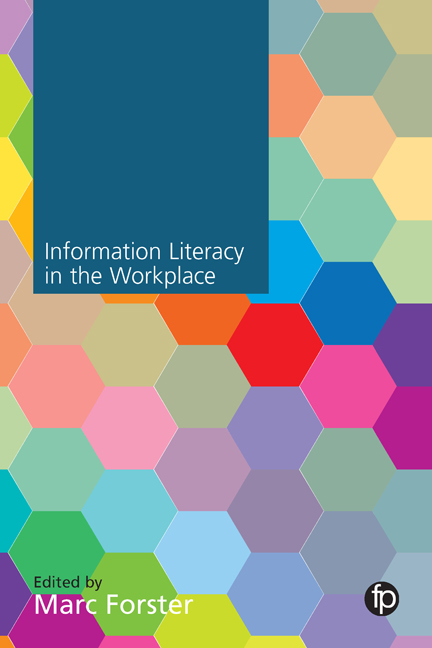Book contents
- Frontmatter
- Contents
- Figures and tables
- Contributors
- Foreword
- 1 Information Literacy and the workplace: new concepts, new perspectives?
- 2 How is Information Literacy experienced in the workplace?
- 3 Information Literacy and the personal dimension: team players, empowered clients and career development
- 4 From transaction to transformation: organizational learning and knowledge creation experience within Informed Systems
- 5 Virtuality at work: an enabler of professional Information Literacy
- 6 Determining the value of Information Literacy for employers
- 7 Information Literacy's role in workplace competence, ‘best practice’ and the ethics of professional obligation
- 8 Learning within for beyond: exploring a workplace Information Literacy design
- 9 Developing information professional competences in disciplinary domains: a challenge for higher education
- 10 The ‘hidden’ value of Information Literacy in the workplace context: how to unlock and create value
- 11 The ‘Workplace Experience Framework’ and evidence-based Information Literacy education
- References
- Index
9 - Developing information professional competences in disciplinary domains: a challenge for higher education
Published online by Cambridge University Press: 08 June 2018
- Frontmatter
- Contents
- Figures and tables
- Contributors
- Foreword
- 1 Information Literacy and the workplace: new concepts, new perspectives?
- 2 How is Information Literacy experienced in the workplace?
- 3 Information Literacy and the personal dimension: team players, empowered clients and career development
- 4 From transaction to transformation: organizational learning and knowledge creation experience within Informed Systems
- 5 Virtuality at work: an enabler of professional Information Literacy
- 6 Determining the value of Information Literacy for employers
- 7 Information Literacy's role in workplace competence, ‘best practice’ and the ethics of professional obligation
- 8 Learning within for beyond: exploring a workplace Information Literacy design
- 9 Developing information professional competences in disciplinary domains: a challenge for higher education
- 10 The ‘hidden’ value of Information Literacy in the workplace context: how to unlock and create value
- 11 The ‘Workplace Experience Framework’ and evidence-based Information Literacy education
- References
- Index
Summary
This chapter will discuss:
• the ways in which higher orders of information professional competence, including Information Literacy (IL), can be introduced into programmes of higher education teaching and learning.
• how such an approach to information professional education can lead to a deeper and wider dissemination across workplace occupations and domains, and see these competences embedded in organizational learning and personal development.
Introduction
Information Literacy is the child of an age when there was a clear and purposeful link between physical documents as the primary stores of recorded information and libraries and other physical locations as repositories. The principles and practices of librarianship provided the main means of management of content and access. For all the detail and complexity that lay behind this relationship, the user, in any form and from any perspective, was presented with a straightforward and largely linear model of access and use. Information Literacy could be constructed on the premise that a map of the bibliographical terrain could be perceived, tools designed to provide access and means found to obtain what the user needed. Not quite a one-dimensional environment but one in which a clear underlying logic could be presented to help complete the information cycle from production to consumption. The search for information and the mastery of the tools to access it can be viewed as a two-dimensional spatial problem. Providing IL (as it is now called) – or its contemporary equivalents of ‘reader advice’ (pre-1960s), user education’ (1960s), ‘information skills’ (1970s and 1980s) and ‘inform - ation education’ (from the 1990s onwards) – started with a default position of a skill transfer from librarian or information professional to reader and user. Some ideas of the substance and complexity of these issues have been ably reviewed by Nigel Ford (Ford, 2004; 2008) and are carried forward by fellow contributors to this collection.
However, the impetus was slowly changing from a librarian-centric view towards the user-centric view. Making the goal a shift of power from librarian or information professional to the user was very much in tune with educational and pedagogical theory. The skilled and informed user would be transformed into an independent learner and then be set on a path to independent and critical thinking.
- Type
- Chapter
- Information
- Information Literacy in the Workplace , pp. 113 - 130Publisher: FacetPrint publication year: 2017



